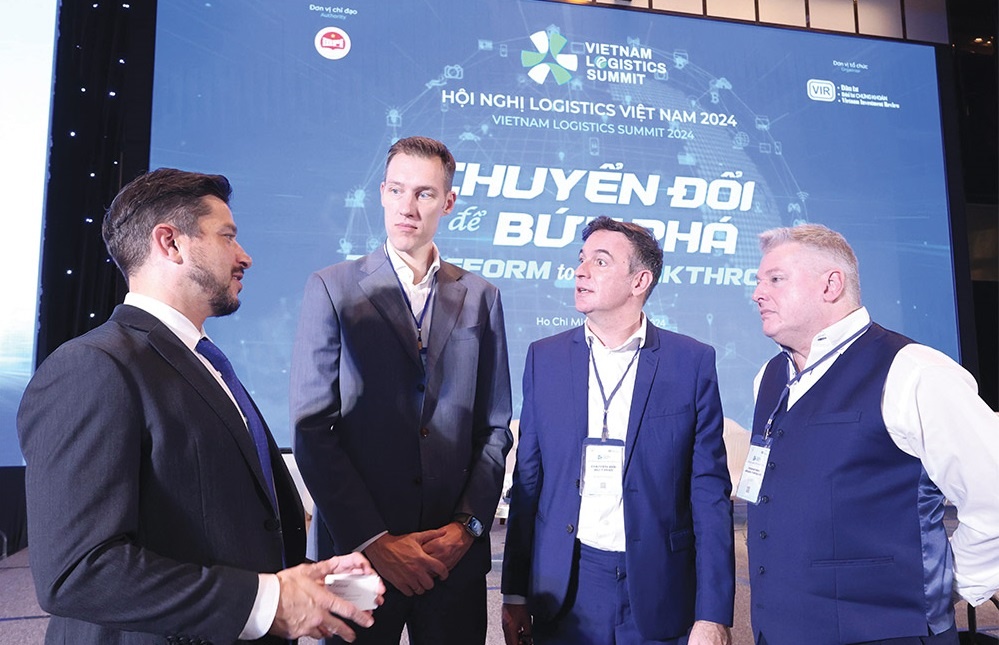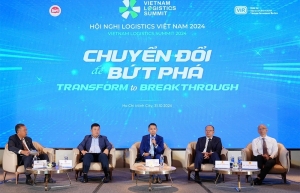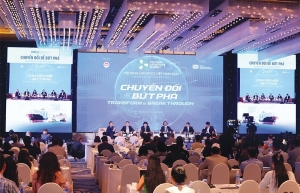Digitalisation paves way for logistics market to compete
 |
| Participants and the Vietnam Logistics Summit stressed the importance of digitalisation, photo Le Toan |
Vietnam’s logistics sector has emerged as one of the fastest-growing industries globally, driving an influx of foreign companies entering the market. To attract even more funding, the country has developed key ports and transportation corridors in localities like Haiphong and Cai Mep, significantly enhancing throughput and vessel capacity.
As heard at the Vietnam Logistics Summit hosted by VIR last week, Noi Bai International Airport in Hanoi is undergoing significant expansions in cargo handling facilities to meet the rising demand for high-value, advanced goods, especially in electronics production. Moreover, the expansion of Haiphong Port in the north and raised capacity at the future Long Thanh International Airport in the south are essential developments for the logistics and import-export sectors. Consequently, digital transformation plays a crucial role in enabling companies to remain competitive.
At the summit, Eric Herding, managing director of DSV Air and Sea Vietnam, emphasised that IT personnel, process changes, and data quality all drive the digital transformation process. “However, digitising without a clear purpose makes success difficult. The success rates of digital transformation projects vary, so the most crucial aspect lies in the human mindset,” Herding said.
He explained that DSV is also focusing on creating data and calculations to help clients and their businesses establish a CO2 emissions baseline for the transport services it provides. “With this critical data, we can analyse and evaluate opportunities to reduce emissions. Collecting data and applying technology and expertise are essential to achieving related goals,” Herding added.
Meanwhile, ABeam Consulting shared its commitment to leveraging its digital transformation expertise to foster sustainable supply chain evolution across Asia. Drawing from profound project experience, ABeam is deploying digital twin technology, which integrates grid data and AI to digitise vast datasets, including transportation routes and modes. By analysing these with AI, clients benefit from continuous monitoring, allowing them to track and enhance systems with ease.
“Given Vietnam’s unique geography, logistics hubs need to prioritise sustainability, speed, and convenience – essential factors for customer satisfaction,” said Yoshihiro Wake, Transglobal Expansion Frontier lead at ABeam Consulting. “Digital twins allow diverse scenario simulations, making it a pivotal application in Vietnam’s logistics sector to devise optimal transportation strategies. We believe this technology will be highly effective here.”
To address fragmented logistics hubs and an ever-changing business environment, ABeam Consulting has developed the Coupa digital twin, enabling clients to prioritise data analysis for operational cost reduction and optimisation.
“The core value of this technology lies in cultivating a culture of continuous technological and operational improvement. ABeam’s clients have become proficient in running proactive simulations, empowering them to swiftly respond to global logistics market shifts. Digital twins are designed for constant monitoring and adjustments to suit the dynamic business landscape, which is particularly beneficial in Vietnam’s fast-paced market,” added Wake.
Also at the summit, Dinh Thanh Son, deputy CEO of Viettel Post, highlighted that the first step in digital transformation is to transform the workforce itself.
“With 40,000 employees nationwide, Viettel Post has undergone digital transformation across all operations using the Internet of Things, with investments in advanced related devices and training for employees, allowing us to harness data and analyse it with AI,” he said.
Post-transformation, the company introduced robotics into operations, significantly increasing productivity in sorting areas. The robots operate around the clock in warehouses, reducing delivery costs by roughly 40 per cent. Through digitalisation, automation, and process optimisation, delivery costs are substantially lowered, ultimately enhancing customer service and satisfaction.
The company has also invested in infrastructure in Ho Chi Minh City, the central city of Danang, and Hanoi. Additionally, warehouses have been established in every locality to prepare for an e-commerce boom. “Our ultimate goal is to reduce costs for both consumers and the company. In Vietnam, achieving the lowest delivery price is difficult; instead, we aim to continuously lower rates for our customers,” stated Son.
He acknowledged that there is a current focus on China exporting goods to the Vietnamese market at very low prices. Thus, Viettel Post must also work diligently to find optimal solutions and strategies to cut costs and time for its customers.
“Viettel Post can match the capabilities of our counterparts, and we can adopt their models. However, to shorten delivery times and reduce costs for both parties, sellers’ goods must be readily available in stock. If each party selects different sectors, warehouses, and products, it will be challenging to achieve significant time and cost savings,” Son said.
 | Costs and competition head logistics advancement issues Accelerating transport infrastructure connections and investing in the development of logistics centres is the key to helping reduce logistics costs and increasing competitiveness for businesses. |
 | Green is new buzzword for logistics arena As sustainable development becomes a mandate to operate in the logistics industry, companies are stepping up their efforts to green their operations. |
 | The key to digital investment is a human mindset Digital transformation helps businesses remain competitive in a logistics market challenged by unpredictable economic and political shifts worldwide. Eric Herding, managing director of DSV Air & Sea Vietnam spoke with VIR’s Hong Nam about how logistics companies should make digital and green transformation a priority, guided by clear goals and human communication. |
What the stars mean:
★ Poor ★ ★ Promising ★★★ Good ★★★★ Very good ★★★★★ Exceptional
Related Contents
Latest News
More News
- Kurz Vietnam expands Gia Lai factory (February 27, 2026 | 16:37)
- SK Innovation-led consortium wins $2.3 billion LNG project in Nghe An (February 25, 2026 | 07:56)
- THACO opens $70 million manufacturing complex in Danang (February 25, 2026 | 07:54)
- Phu Quoc International Airport expansion approved to meet rising demand (February 24, 2026 | 10:00)
- Bac Giang International Logistics Centre faces land clearance barrier (February 24, 2026 | 08:00)
- Bright prospects abound in European investment (February 19, 2026 | 20:27)
- Internal strengths attest to commitment to progress (February 19, 2026 | 20:13)
- Vietnam, New Zealand seek level-up in ties (February 19, 2026 | 18:06)
- Untapped potential in relations with Indonesia (February 19, 2026 | 17:56)
- German strengths match Vietnamese aspirations (February 19, 2026 | 17:40)

 Tag:
Tag:


















 Mobile Version
Mobile Version